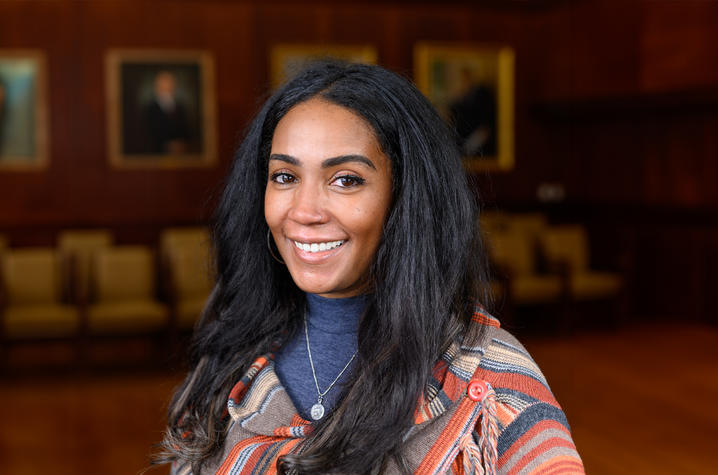‘Research Made Possible’ podcast: Conner discusses HIV prevention in older Black women

LEXINGTON, Ky. (Feb. 22, 2024) — When Laneshia Conner was in graduate school, an instructor told her that she had great questions. From there, she says she began to find that she had more questions than answers. In this “Research Made Possible” podcast produced by Research Communications, Conner discusses her work that is centered on improving scientific knowledge about HIV prevention for older Black women.
“This is where my interest in HIV and aging, that intersection, really began,” said Conner, Ph.D., an assistant professor in the University of Kentucky College of Social Work. “I had a small number of older people who were living in the community that were HIV positive, or they had been diagnosed with AIDS, but they were still living and thriving, and I was interacting with them.”
One unforgettable interaction occurred as Conner was leaving a client’s home. She gave the older Black woman a hug as they were saying goodbye and her client responded, “People don’t touch me anymore.”
Following that impactful moment, Conner says she targeted her research on HIV prevention for older Black women and the stigma surrounding the disease. She went on to earn her doctorate from the University of Louisville, and she joined UK in 2020.
“We have seen HIV rates stabilize in certain groups, and that’s what we want,” said Conner. “In older, Black women, 50 and older, the numbers are going up. So, what that tells me is, after almost five decades of dealing with this disease, we’re still not asking the right questions for certain groups.”
Conner is refining interventions for older Black women with HIV, studying their health and reproductive health history, environments, trauma, and the sociocultural effects on their lives. In 2022, Conner received funding for her research as a UK Building Interdisciplinary Research Careers in Women’s Health (BIRCWH) Scholar. This training program is funded by the Office of Women’s Health Research and the National Institute on Drug Abuse at the National Institutes of Health (NIH).
In addition to her work on HIV and aging, Conner was recently recognized for her exceptional research achievements on the interactions between Black faculty and Black administrators by the Society for Social Work and Research. This study focused on the group experiences of Black faculty in higher education with Black administrators.
Listen to the podcast on SoundCloud.
As the state’s flagship, land-grant institution, the University of Kentucky exists to advance the Commonwealth. We do that by preparing the next generation of leaders — placing students at the heart of everything we do — and transforming the lives of Kentuckians through education, research and creative work, service and health care. We pride ourselves on being a catalyst for breakthroughs and a force for healing, a place where ingenuity unfolds. It's all made possible by our people — visionaries, disruptors and pioneers — who make up 200 academic programs, a $476.5 million research and development enterprise and a world-class medical center, all on one campus.




